

Politics
Can You Still Get Your COVID and Flu Vaccines This Season? Find Out Now!
Published
1 month agoon
By
OBS
During his confirmation hearings in January, Robert F. Kennedy Jr. made senators a promise: that he would not take actions to restrict access to vaccines.
Seven months into his tenure as Health and Human Services secretary, the pledge appears to be looking increasingly tenuous.
RFK Jr., a vaccine skeptic, has implemented sudden regulatory changes that have divided the country along party and regional lines, leaving public health experts warning of unprecedented confusion as states stray from the Trump administration’s guidelines.
No agency under RFK Jr.’s leadership has been more disrupted than the Centers for Disease Control and Prevention, which traditionally recommended vaccines for Americans.
In June, all 17 members of its independent advisory panel on immunization were dismissed and replaced with several known vaccine skeptics. RFK Jr. claimed the reshuffle was necessary “to re-establish public confidence in vaccine science.”
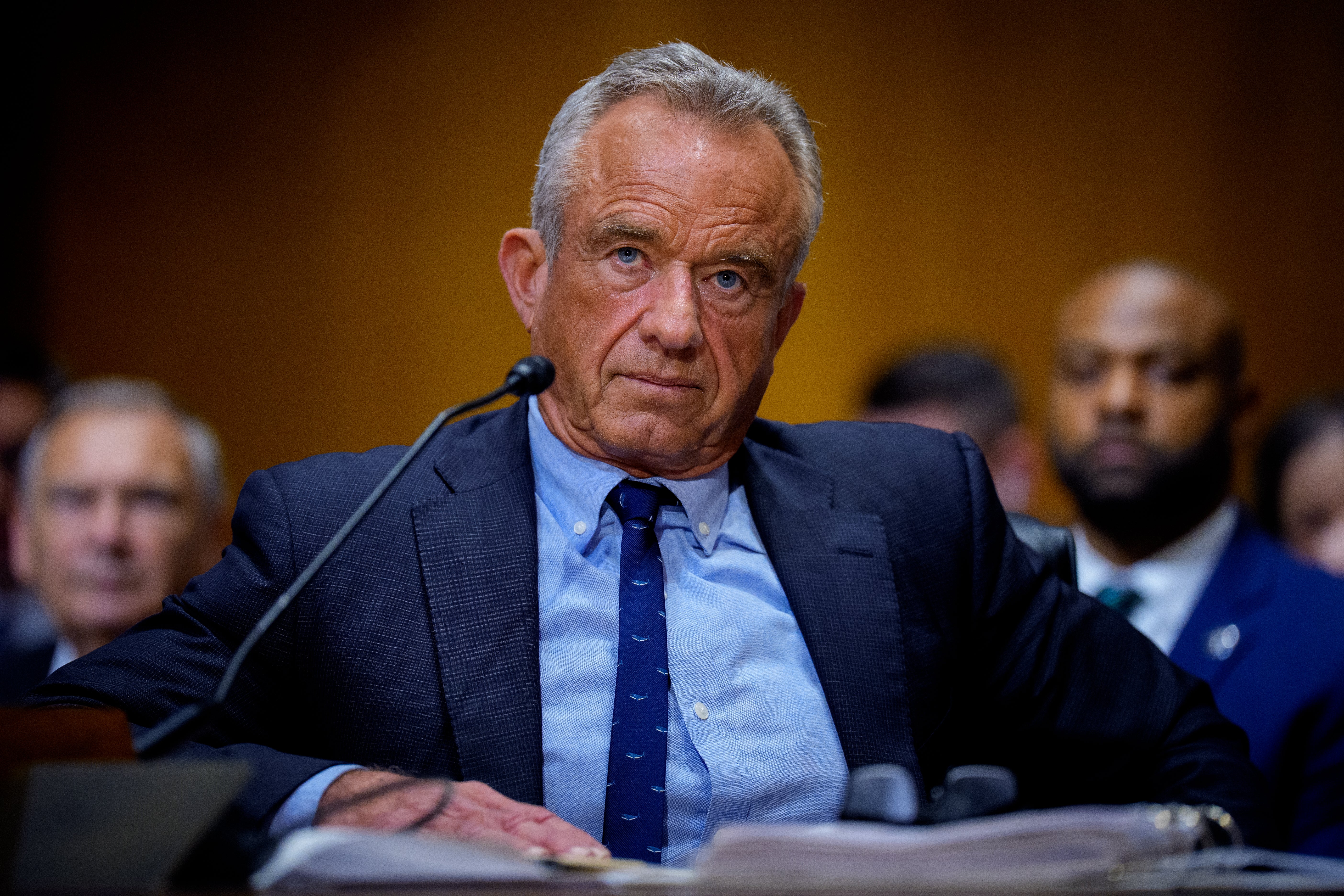
He also cancelled $500 million in federal funding for mRNA vaccines being developed to counter viruses that cause diseases such as the flu and Covid-19. By late August, the CDC’s former director, Susan Monarez, was removed from her post just weeks into the job.
Meanwhile, the Food and Drug Administration narrowed its approval of updated versions of Covid-19 shots for people under 65 to those with at least one underlying condition. No one else is eligible for – even those living with a high-risk individual.
As virus season rapidly approaches, states have been left in flux. Some officials, clinicians and insurers have been mobilizing behind the scenes to preserve access to vaccines; others appear to have done the opposite.
Last Wednesday, a day before RFK Jr.’s contentious Senate Finance Committee hearing, Washington, Oregon, California and Hawaii announced they would band together as the West Coast Health Alliance to issue vaccine recommendations of their own and counter the “destruction” inflicted on the CDC.
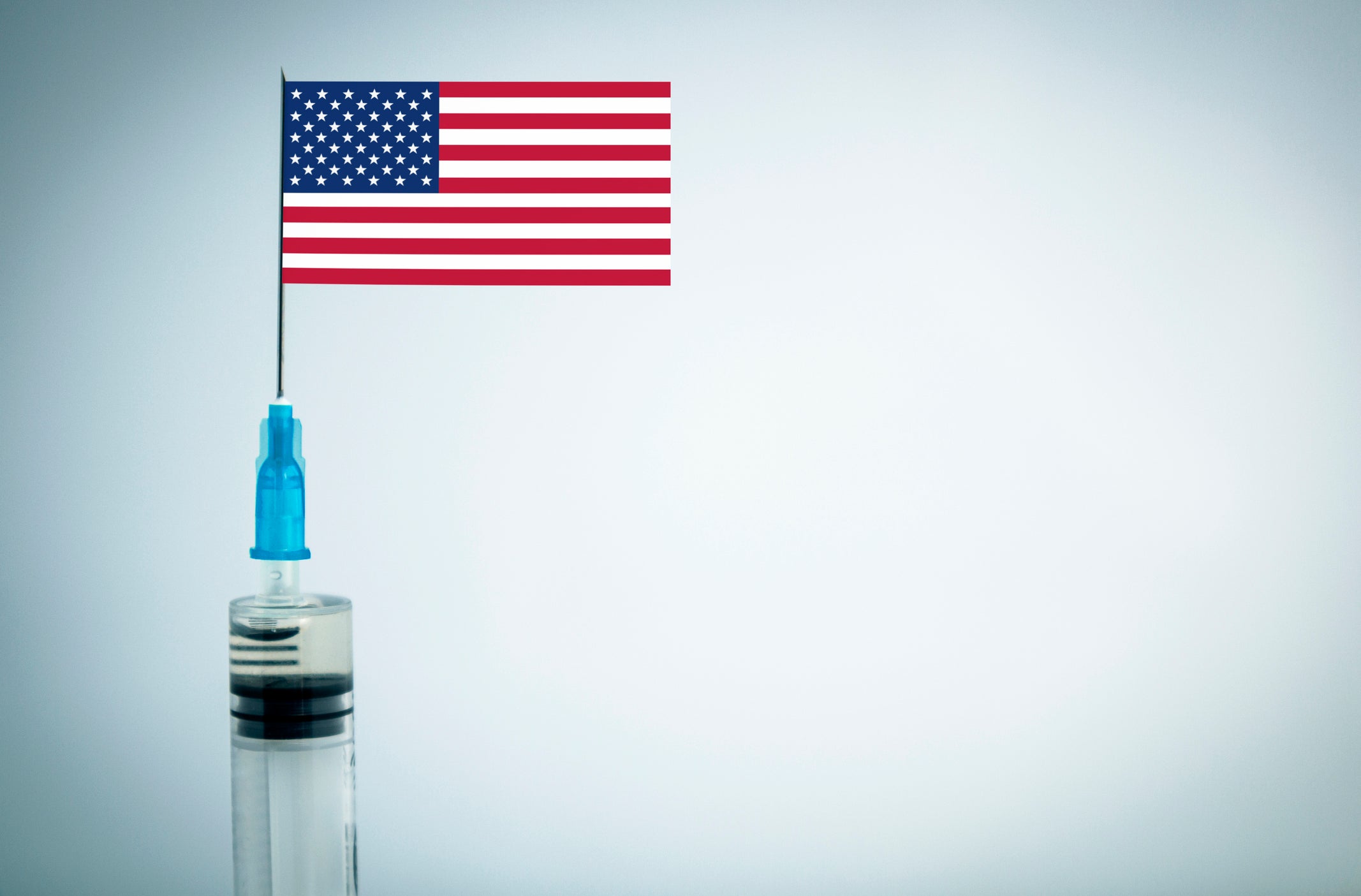
The new coalition of Western, Democratic states is intended to provide residents with scientific data about vaccine safety and efficacy, and to issue guidance on vaccines for respiratory illnesses like Covid-19 and the flu, and a variety of childhood immunizations.
Hours later, Florida announced it would become the first state to abolish school vaccine mandates, seemingly at odds with Florida parents, who, according to a recent KFF-Washington Post poll, expressed overwhelming support for childhood vaccine requirements.
Spearheading the shift, Florida Surgeon General Joseph Ladapo denounced mandates as a violation of bodily autonomy and declared during a Tampa news conference that “every last one of them is wrong and drips with disdain and slavery.”
Florida Governor Ron DeSantis also endorsed the plan, though it was not clear whether it would require legislative input.
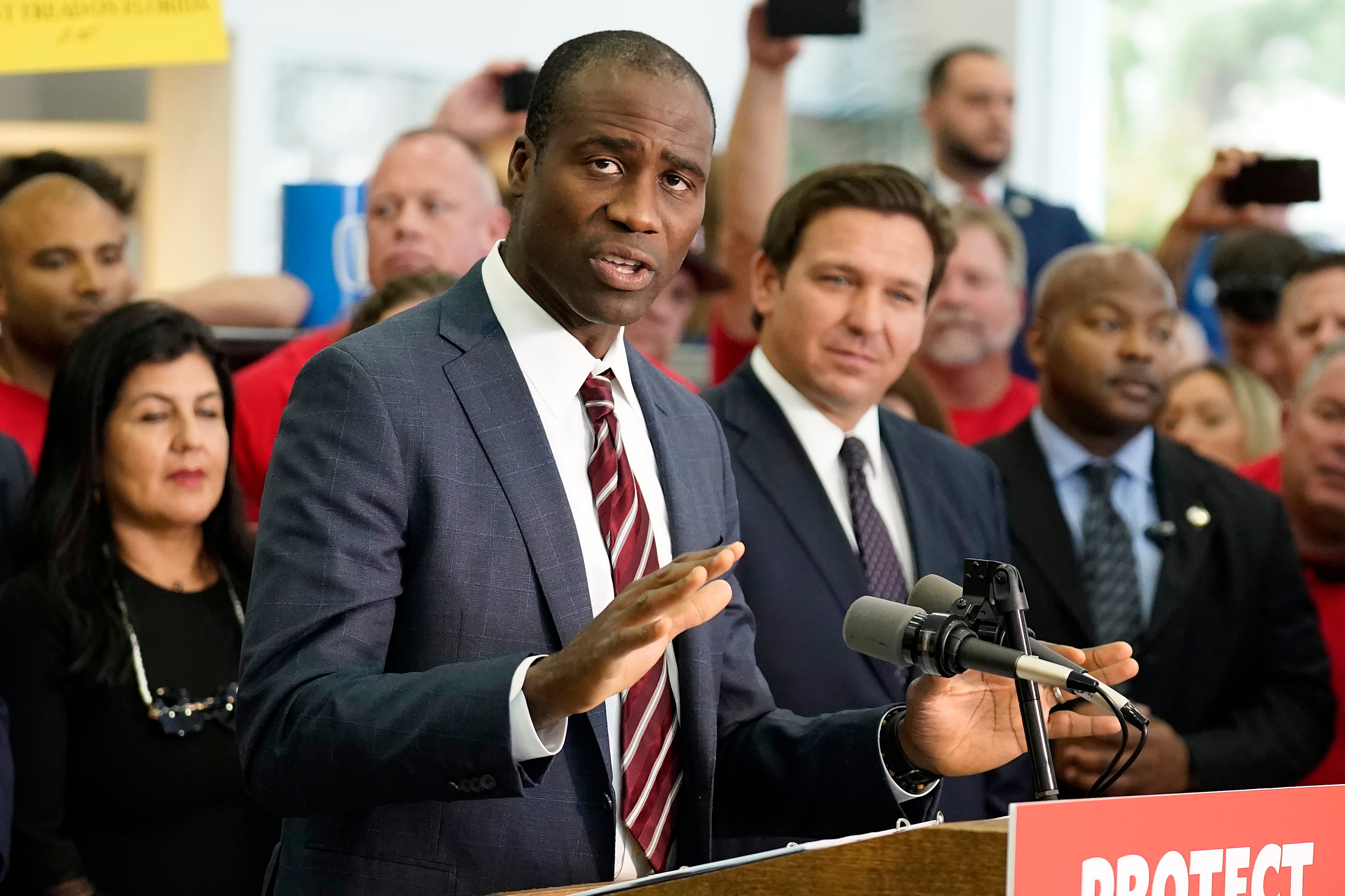
Elsewhere, states have stepped in the opposite direction.
Officials in New Mexico, Massachusetts, Pennsylvania and Colorado have issued orders that allow pharmacies to administer Covid-19 vaccines without prescriptions.
Massachusetts Gov. Maura Healey on Thursday ordered insurers to cover all immunizations recommended by the state Department of Public Health – from routine childhood shots to measles – regardless of whether they carry federal endorsement.
New York Gov. Kathy Hochul joined the Democrat-run states in signing an executive order last Friday to protect near-universal access to Covid-19 vaccines in the state. The declaration of disaster is in effect until October 5 and will allow pharmacists to administer vaccines for the virus to patients ages three and up.

In Minnesota, Gov. Tim Walz signed a similar executive order on Monday to preserve access to Covid-19 vaccines.
The New Jersey Department of Health went a step further Wednesday, expanding access to vaccines for the disease for anyone six months of age or older.
Virginia Health Commissioner Karen Shelton also cleared the way Wednesday for adults aged 65 and over and those with certain medical conditions aged 18 to 64 to receive coronavirus vaccines in pharmacies without needing a prescription.
Illinois remains undecided: its health department continues to consult medical experts and expects to issue formal guidance by the end of September.
“In the absence of federal leadership, we will have 50 states doing 50 different things,” Kyle McGowan, a former chief of staff at the Centers for Disease Control and Prevention during the first Trump administration, told the Washington Post.
“We saw this during the early stages of Covid-19 as well with states just doing what they hoped was right because of the chaos at the federal level.”
You may like
-


Can’t Tell If It’s Covid or the Flu? Here Are the Key Symptoms You Must Recognize as Cases Surge!
-


Is China Beating the US in the Trade War? Find Out Now!
-
Surprising News: Inflation Plummets to 18.02% After Six-Month Decline – Find Out What This Means for You!
-
Unbelievable Surge: Stock Market Rakes in N20bn Gain! Find Out What Happened!
-


Trump Claims Infantino Would Instantly Shift World Cup Matches at His Request – Find Out Why!
-


Should You Get a Flu Vaccine? Doctors Say These Groups Must Get the Shot!
Politics
Scary Moment: Pete Hegseth’s Plane Make Emergency Landing in the UK!
Published
2 weeks agoon
October 16, 2025By
OBS
An airplane carrying Secretary of War Pete Hegseth was forced to make an emergency landing in the UK Wednesday due to a crack in its windshield, officials said.
Pentagon spokesperson Sean Parnell wrote on social media that on the way back to the U.S. after NATO’s Defense Minister meeting in Belgium, the plane made an “unscheduled landing in the United Kingdom” because of a crack in the aircraft’s windshield.
The plane landed based on standard procedures, and all of the passengers on board, including Hegseth, were safe, Parnell added.
“All good. Thank God,” Hegseth wrote on X. “Continue mission!”
Hegseth was traveling in a C-32A, a modified Boeing 757 used by the Air Force for VIP transport. Other top leaders, including Secretary of State Marco Rubio, Vice President JD Vance and occasionally, even President Donald Trump, use the aircraft when visiting airports with runways too short for the modified Boeing-747 Trump typically uses as Air Force One.
It was unclear what caused the crack in the plane’s windshield.
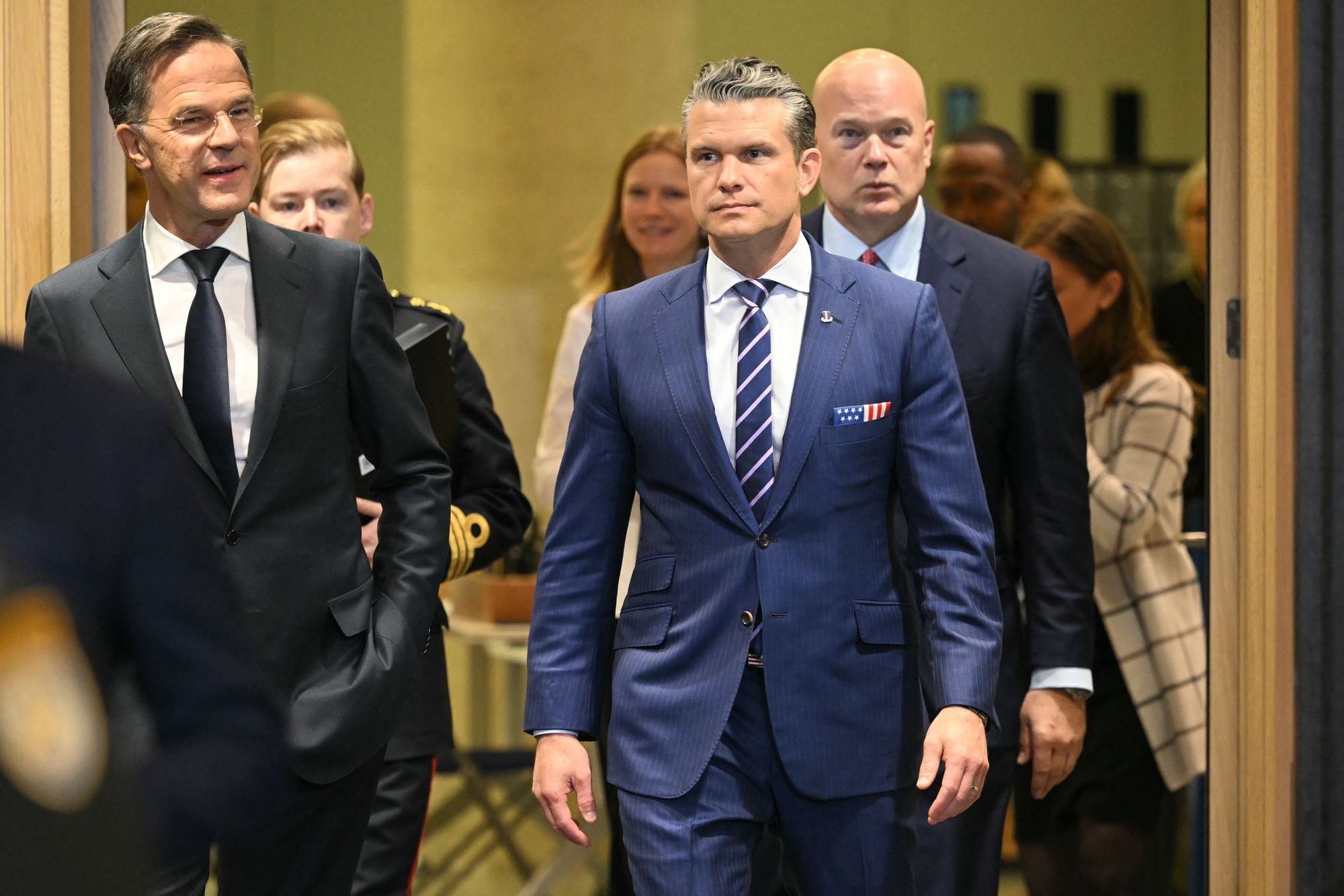
Flight tracking data showed that the plane took off from Brussels and made it past Ireland before turning around to land at Royal Air Force Mildenhall in England at 7:07 p.m. local time. It was not known what time the plane initially took off.
Hegseth and previous Secretaries of Defence have traditionally used a different aircraft for foreign travel, the Boeing E-4B.
The Boeing E-4B is a modified Boeing-747 that has been hardened for use as an airborne command post by the president or Pentagon leadership during nuclear conflicts. It is known within the Air Force as “Air Force One when it counts” and the “Doomsday plane.”
It was not immediately clear why Hegseth was traveling on the smaller, C-32 plane.
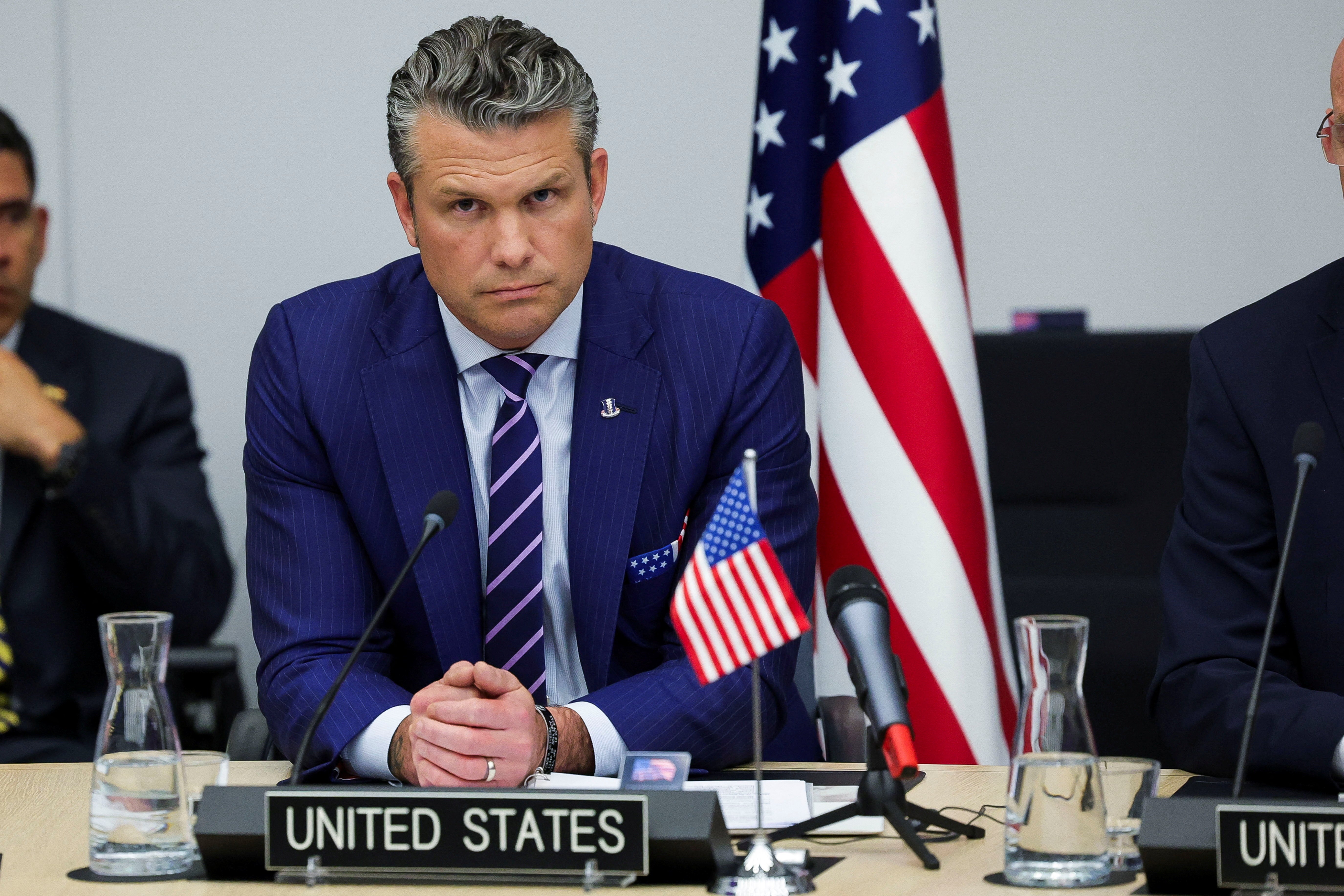
The C-32, which had to perform an emergency landing, has less capabilities than the E-4B, but is decked out with a more luxurious interior thanks to upgrades made during Trump’s first term as president.
During his time in Brussels, Hegseth warned the U.S. would “impose costs on Russia for its continued aggression” if the war in Ukraine does not come to an end.
“If we must take this step, the U.S. War Department stands ready to do our part in ways that only the United States can do,” Hegseth said at a meeting of the Ukraine Defence Contact Group of Kyiv’s allies at NATO headquarters.
Hegseth did not elaborate. His comments came as Trump’s administration is considering a request by Ukraine for long-range Tomahawk missiles.
Earlier this year, an Air Force plane carrying Rubio to Munich was forced to return to Washington after experiencing a mechanical problem.
Politics
Is China Beating the US in the Trade War? Find Out Now!
Published
2 weeks agoon
October 16, 2025By
OBS
The trade war between China and the US intensified this week with both nations imposing new port fees on each other’s ships.
The latest escalation in tensions between the world’s two largest economies sent bilateral relations, and the markets, into a tailspin.
After Beijing announced stricter restrictions on rare earth exports – in retaliation for the US dramatically expanding sanctions on Chinese firms – president Donald Trump threatened 100 per cent tariffs and new curbs on “all critical software”.
Trade analysts suspect that Mr Trump’s threatened three-digit tariff will heighten market uncertainty in the near term, especially in sectors with strong supply chain exposure to China like manufacturing and technology.
Rare earths, vital for use in electric vehicles, aircraft engines, military radars and a range of everyday electronics, are a key sticking point in negotiations between the sparring nations.
China produces almost 70 per cent and processes nearly 90 per cent of the world’s rare earth elements.
The Chinese announcement was an apparent surprise to Mr Trump, who called it an “out of the blue” move. But, over the weekend, he sounded more conciliatory than in the past, although he still refused to withdraw the tariff threat.
In a post on Truth Social, Mr Trump said: “The U.S.A. wants to help China, not hurt it!!!”
China seems unfazed by Mr Trump’s threats and its export boom suggests Beijing may be gaining the upper hand in the trade war.
“China’s position is consistent. If there’s a fight, we will fight to the end; if there’s a talk, the door is open,” a Chinese commerce ministry spokesperson said on Tuesday.
“The US cannot demand talks while simultaneously imposing new restrictive measures with threats and intimidation. This is not the right way to engage with China.”
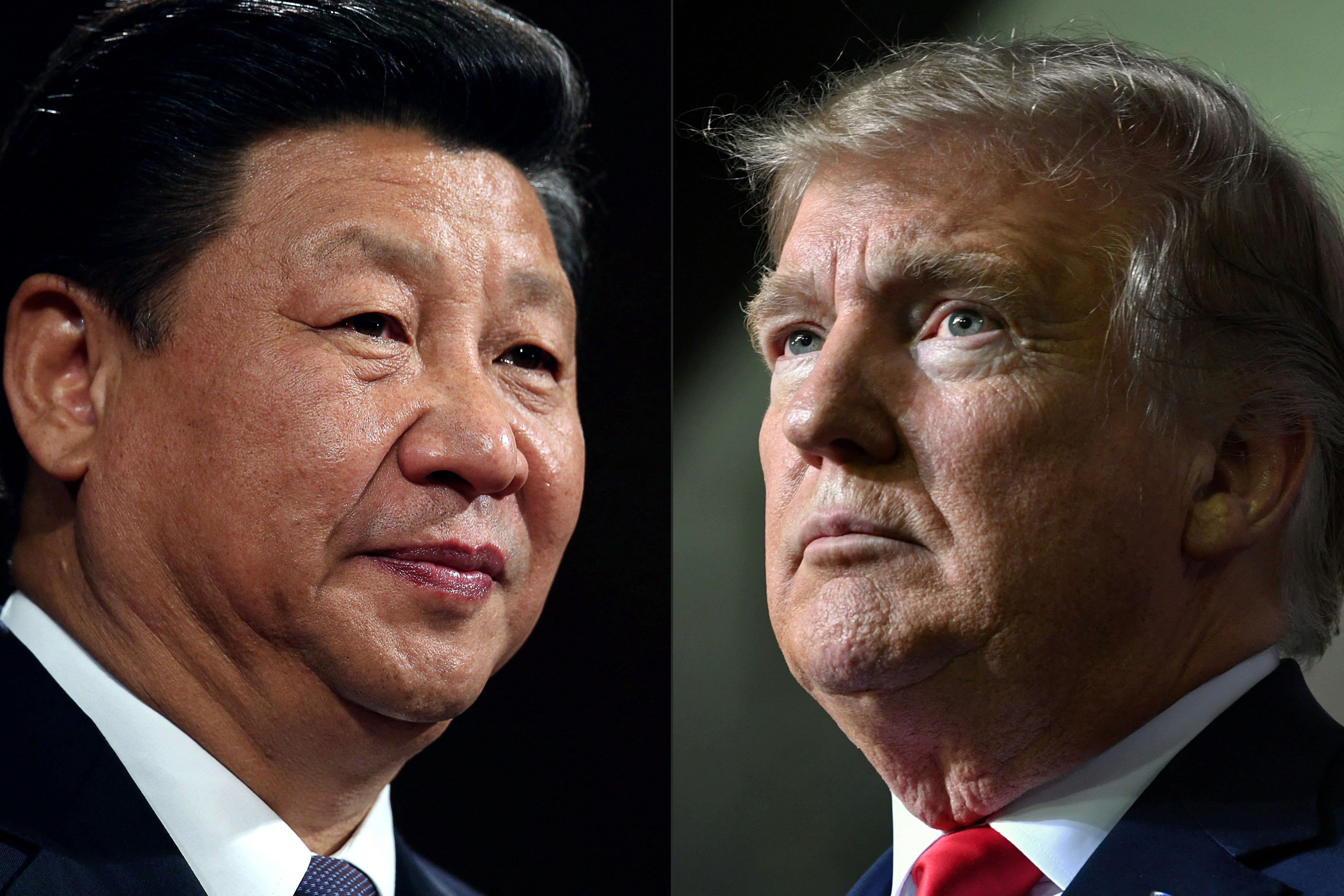
Is China winning the trade war?
China appears to be gaining the upper hand in the ongoing trade dispute with the US, nearly six months after Mr Trump imposed steep import levies on the Asian economic giant.
Chinese exports rose 8.3 per cent in September from a year earlier to about £246bn even as shipments to the US fell about 27 per cent.
After Mr Trump declared his worldwide tariffs in April, several major countries moved to diversify their foreign trade, signalling a global shift towards a system where the US was no longer the central market.
In line with this shift, Chinese shipments to non-US destinations grew 14.8 per cent, the fastest since March 2023, according to data from the General Administration of Customs. The exports to the EU grew 14 per cent, to Asean countries by 16 per cent and to Africa about 56 per cent.
The minimal impact of the Trump tariffs on its overall trade only strengthened China’s resolve to adopt a firmer position in negotiations with Washington, as reflected in the stricter restrictions on exports.
Strong demand from markets beyond the US indicates that Chinese exporters may be less vulnerable to the additional tariffs threatened by Mr Trump. Chinese imports were up 7.4 per cent last month, pointing to a potential recovery in domestic consumption.
A self-driven recovery in China would mark a clear erosion of US dominance in the global economy. But analysts caution it is too soon to declare a winner in the trade dispute.
“While China’s recent export growth suggests some resilience, it doesn’t necessarily indicate that Beijing has gained an advantage in the trade war,” Lukman Otunuga, a senior market analyst at broker FXTM, told The Independent.
“Much of that uptick could reflect front-loading of shipments ahead of new tariffs or shifts in trade routes. The overall picture remains mixed, with both economies experiencing structural challenges amid the prolonged trade tensions.”

Mr Otunuga said the additional US levies were likely to heighten market uncertainty in the near term, and “investors may see higher volatility as markets weigh the impact on corporate earnings and global growth prospects”.
What are the new levies?
Mr Trump last week unveiled an additional levy of 100 per cent on Chinese imports to the US, along with new export controls on critical software, from 1 November. He also threatened to cancel a planned in-person meeting with President Xi Jinping, their first in six years, but US treasury secretary Scott Bessent later told Reuters the two leaders were on track to meet in South Korea in late October.
Bloomberg Economics estimates that a 100 per cent tariff hike by the US will raise effective rates on Chinese goods to 140 per cent, which could halt trade altogether.
“So far this year, China has shown that while it does not wish for a trade war, it is willing to retaliate to escalations as needed,” Lynn Song, chief Greater China economist at ING Bank NV, told Bloomberg.
“The export resilience will likely strengthen confidence in this approach ahead of the talks later this month.”
According to the Peterson Institute for International Economics, average US tariffs on Chinese imports reached 58 per cent by end of September, while Chinese tariffs were at 33 per cent.
Despite current rates already sitting 25 percentage points above the global average, China’s manufacturing strength continues to drive export growth.
In a tit-for-tat move, China hit US-owned vessels docking in the country with new port fees, which came into effect on Tuesday.
Vessels owned or operated by American companies or individuals would be subjected to a 400 yuan (£42) per net tonne fee per voyage if they were to dock in China, Beijing announced last week. The fees would be applied on the same ship for a maximum of five voyages each year, and would rise every year until 2028, when it would jump to 1,120 yuan (£117) per net tonne.
The duties are largely aligned with the port fees introduced by the US. Vessels owned or operated by Chinese entities will be charged $50 (£37) per net tonne for each voyage to the US, which will rise by $30 (£22) per net tonne each year until 2028.
China’s new port fees could affect oil tankers accounting for 15 per cent of global capacity, according to Clarksons Research.
Will Donald Trump meet Xi Jinping to negotiate trade?
Mr Trump and Mr Xi were expected to meet at the Apec summit in South Korea at the end of October. There was also talk of the US president visiting Beijing in January, but those meetings appeared less probable after the recent escalation in tensions.
Mr Bessent said the US president remained on track to meet the Chinese leader as he sought to reassure traders and investors on both sides of the Pacific, highlighting the cooperation between their negotiating teams and the possibility they could yet find a way forward from the current tariff truce.
“We have substantially de-escalated,” Mr Bessent told Fox Business Network on Monday.
Substantial communications between the two sides had taken place over the weekend and there would be US-China staff-level meetings this week in Washington on the sidelines of the World Bank and International Monetary Fund annual gatherings, he added.
“The 100 per cent tariff does not have to happen,” Mr Bessent said. “The relationship, despite this announcement last week, is good. Lines of communication have reopened, so we’ll see where it goes.”
“President Trump said the tariffs would not go into effect until November 1,” he added. “He will be meeting with Party Chair Xi in Korea. I believe that meeting will still be on.”
Washington and Beijing have been negotiating since May.
China’s commerce ministry confirmed on Tuesday that a working-level meeting had taken place the previous day.
It also highlighted formal negotiations held earlier in London, Stockholm and Madrid, culminating in a 90-day tariff extension.
The ministry, however, warned that “the US cannot ask for talks while simultaneously threatening new restrictive measures”.
Politics
Latest Ukraine-Russia War Update: Trump Official Says Putin Will Pay the Price if Fighting Continues!
Published
2 weeks agoon
October 16, 2025By
OBS
US pressures Japan to halt Russian oil imports
US treasury secretary Scott Bessent said he has urged Japan to halt all imports of Russian energy, signalling a harder line from the Trump administration toward allies maintaining limited trade ties with Moscow.
“Minister Kato and I also discussed important issues pertaining to the US–Japan economic relationship and the Administration’s expectation that Japan stop importing Russian energy,” Bessent posted on X after his meeting with Japan’s finance minister Katsunobu Kato in Washington.
The two met on the sidelines of the IMF annual meetings and the G7 and G20 finance leaders’ gatherings being held this week in Washington.”
Japan will do what it can based on the basic principle of coordinating with G7 countries to achieve peace in Ukraine in a fair manner,” Kato told reporters, when asked whether Japan was urged by Bessent to stop importing Russian energy.
Tokyo has already pledged to phase out Russian oil imports as part of the G7’s coordinated sanctions response to Russia’s 2022 invasion of Ukraine.
However, Japan continues to buy Sakhalin Blend crude – a byproduct of liquefied natural gas (LNG) production from the Sakhalin-2 project in Russia’s Far East.
The energy source remains crucial for Japan, providing about 9 per cent of its total LNG imports, a key component of its energy security.
Shweta Sharma16 October 2025 04:01
IMF chief plans to visit Ukraine, Bloomberg reports
The International Monetary Fund’s managing director, Kristalina Georgieva, plans to travel to Ukraine, supporting its efforts to secure a new loan package in the fourth year of the war, Bloomberg has reported.
An IMF spokesperson said: “Our staff remains actively engaged with the Ukrainian authorities on macroeconomic policies aimed at maintaining stability, financing essential expenditures, and restoring debt sustainability, with a view to continued IMF support.”
The exact time of the visit is yet to be determined.
Harriette Boucher16 October 2025 04:00
India to stop buying Russian oil, Trump claims
Trump said on Wednesday that Indian Prime Minister Narendra Modi has pledged to stop buying oil from Russia, India’s top oil supplier, but could not halt its shipments “immediately”.
The announcement comes as Trump tries to step up efforts to cut off Moscow’s energy funding.
“Now I’ve got to get China to do the same thing,” Trump told reporters.
The Indian embassy in Washington has not yet confirmed this.
Harriette Boucher16 October 2025 03:00
Zelensky and Greek PM discuss possibility of U.S.-supplied natural gas
Zelensky and Greek Prime Minister Kyriakos Mitsotakis discussed the possibility of the U.S. supplying natural gas to Ukraine as it struggles with the consequences of Russia’s multiple attacks on the country’s energy system.
Ukraine’s president said he was working to strengthen its air defence as much as possible before winter begins.
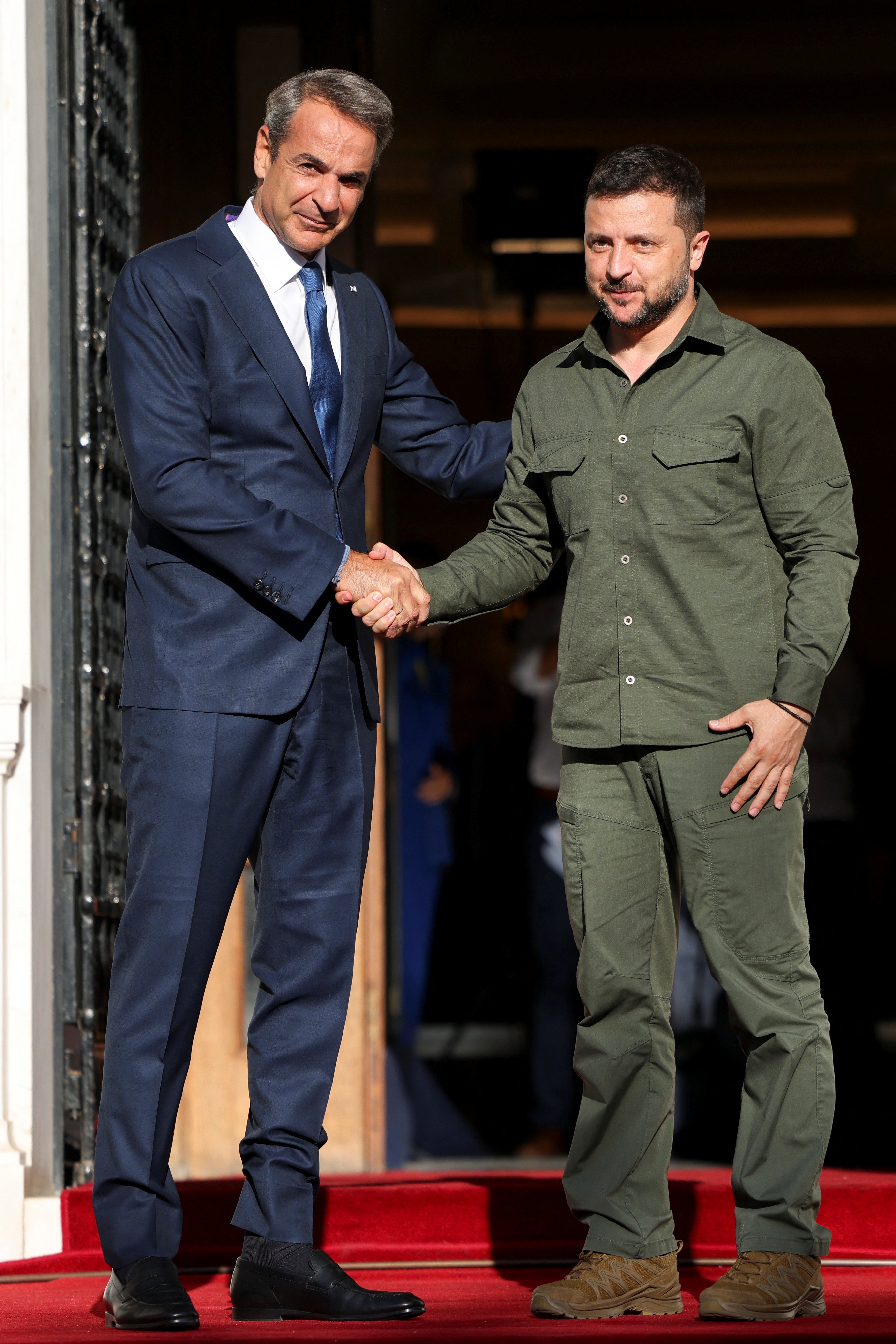
Harriette Boucher16 October 2025 02:00
Ukraine has prepared its ‘homework’ ahead of meeting with Trump, says Zelensky
Ukraine has prepared its “part of the homework” ahead of Zelensky’s meeting with Trump in Washington on Friday.
He says the agenda will be substantive, and the meeting could bring the war closer to an end.
We have already prepared our part of the homework ahead of the meeting with President Trump – both the military component and the economic one. Every detail is ready. The agenda of our meeting with the President of the United States is very substantive, and I thank everyone who… pic.twitter.com/Jwpp5bdn5h
— Volodymyr Zelenskyy / Володимир Зеленський (@ZelenskyyUa) October 15, 2025
Harriette Boucher16 October 2025 01:02
Kremlin denies Trump’s warning that Russian economy set to ‘collapse’
The Kremlin has hit back at accusations by Donald Trump that the Russian economy is on its way to “collapse”.
Asked about Trump’s remarks at an energy conference in Moscow, Deputy Prime Minister Alexander Novak, who oversees energy and the economy for the government, said that Russia had a stable supply of gasoline.
“We have a stable domestic market supply, we see no problems in this regard,” Novak said.
“The balance is maintained between production and consumption, and we, on the part of the government and the relevant ministries, are doing everything to ensure that this remains the case.”
You can read more below…
Nicole Wootton-Cane16 October 2025 00:00
Nato defence ministers agree ‘counter-drone measures’, Rutte says
A meeting of Nato country defence ministers have agreed additional counter-drone measures to step up support to Ukraine, chief Mark Rutte said.
In a post on X he wrote: “Excellent discussions with Defence Ministers, reaffirming increased defence investment, enhanced defence production & stepping up support to Ukraine.
“We will also implement additional counter-drone measures — #NATO is ready to do what it takes to keep our 1bn people safe & our territory secure.”
Nicole Wootton-Cane15 October 2025 23:00
Ukraine has relied on trains during the war – Russia is creating new technology to target them
As war rages on in Ukraine, the country has become reliant on its rail networks, which it has so far managed to keep running despite repeated strikes.
But officials and analysts are warning that advances in Russian drone capabilities and the growing tempo of attacks pose a serious threat to the vital infrastructure.
You can read more below…
Nicole Wootton-Cane15 October 2025 22:00
Trump has threatened to give Tomahawk missiles to Ukraine – but can they turn the tide of the war?
Washington may give access to powerful Tomahawk missiles, with Moscow threatening to respond. Experts tell Nicole Wootton-Cane that the weapons could significantly boost Ukraine – but their power shouldn’t be overstated.
Nicole Wootton-Cane15 October 2025 21:30
Watch: Zelensky confirms meeting with Trump in Washington
Nicole Wootton-Cane15 October 2025 21:00
Categories
Top Tags
Related posts






















